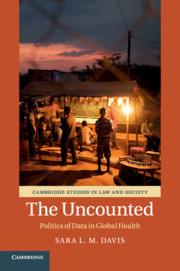Book contents
- The Uncounted
- Cambridge Studies in Law and Society
- The Uncounted
- Copyright page
- Contents
- Figures
- Tables
- Abbreviations and Terms
- Chapter 1 Contested Indicators
- Chapter 2 The Uncounted: Key Populations
- Chapter 3 “Something More than Data”
- Chapter 4 Cost-Effectiveness and Human Rights
- Chapter 5 Modeling the End of AIDS
- Chapter 6 Sustainability, Transition, and Crisis
- Chapter 7 Listening to Women
- Chapter 8 “So Many Hurdles Just to Leave the House”
- Chapter 9 The Panopticon and the Potemkin
- Chapter 10 Data from the Ground Up
- Reflection Questions
- Acknowledgments
- References
- Index
- Cambridge Studies in Law and Society
Chapter 8 - “So Many Hurdles Just to Leave the House”
Published online by Cambridge University Press: 18 May 2020
- The Uncounted
- Cambridge Studies in Law and Society
- The Uncounted
- Copyright page
- Contents
- Figures
- Tables
- Abbreviations and Terms
- Chapter 1 Contested Indicators
- Chapter 2 The Uncounted: Key Populations
- Chapter 3 “Something More than Data”
- Chapter 4 Cost-Effectiveness and Human Rights
- Chapter 5 Modeling the End of AIDS
- Chapter 6 Sustainability, Transition, and Crisis
- Chapter 7 Listening to Women
- Chapter 8 “So Many Hurdles Just to Leave the House”
- Chapter 9 The Panopticon and the Potemkin
- Chapter 10 Data from the Ground Up
- Reflection Questions
- Acknowledgments
- References
- Index
- Cambridge Studies in Law and Society
Summary
This chapter returns to the CVC study in Grenada. Faced with pressure to complete their ambitious six-country size estimation study before their grant ended and donors transitioned out of the Caribbean, CVC focused its efforts on strong engagement of community field workers, who had the trust of their peers and could accompany them in overcoming the numerous barriers to participation. Working through networks of trusted community gatekeepers, CVC and local partners strengthened the role of community-based organizations in the research. The data was difficult to get, but the work of indigenous field workers enabled the researchers to gather granular data about previously undocumented populations including transgender people, as well as documenting incest and other hidden forms of gender-based violence, and to form stronger bonds between civil society and health officials.
Keywords
- Type
- Chapter
- Information
- The UncountedPolitics of Data in Global Health, pp. 198 - 214Publisher: Cambridge University PressPrint publication year: 2020

